Chris Rice's Blog
March 20, 2025
On being people of the dawn: hope in a time of might without morality

In early April, I end my work as Director of the Mennonite Central Committee (MCC) United Nations Office after five years of service. Before that, my wife Donna and I served five years as MCC Representatives for Northeast Asia. We will be moving from New York City back to our previous home in Durham, North Carolina for the next chapter of life. Here’s a parting word from New York.
As I sit in MCC’s tenth floor office in New York, looking over at the United Nations building across the street and thinking about the end of my work here, I realize that this place that brings all the nations of the world face to face, friends and foes alike, is needed more than ever. But only if prophetic voices rise in their midst.
Led by leaders of the world’s superpowers, morality is being turned upside down. Might makes right. Seeking absolute power is an absolute good. It is a hard time in our world.
It reminds me of another time when I had trouble finding hope.
It was 2016, I was with an MCC team in North Korea, and for a week we had been traveling across the country visiting staff and children at pediatric hospitals where MCC sent life-sustaining support. At the very same time, tensions between North Korea and South Korea and the US were rising. MCC’s mission was ultimately about what many Koreans yearn for, on both sides: the 70-year wall of hostility coming down. I grew up in South Korea, now there I was in North Korea, keenly aware of the long history of division and distrust. Never before had I felt such hopelessness. The wall of hostility between the two countries seemed to rise and thicken like a great steel tsunami.
It was a cold winter, and our team was staying at a guest house outside Pyongyang. There was a lake outside the guest house, and it was completely frozen, the ice so thick I had seen solitary figures walking across it.
Early one morning I woke up, restless and disturbed. In the darkness of my room, I opened my book for morning prayer. The first Scripture given for the day, a cry of lament from Jeremiah, leapt out like a dagger:
“Let my eyes stream with tears night and day, without rest, over the great destruction which overwhelms … my people, over her incurable wound … Why have you struck us a blow that cannot be healed? We wait for peace, to no avail; for a time of healing, but terror comes instead” (Jeremiah 14:17, 19).
For many Korean people over many decades, that cry of lament named the truth of the divide. I looked out the window of my room. My heart felt like the dark and bitter cold I saw outside.
But I kept working my way through the day’s readings and prayers.
And after a few minutes, these words came as an interruption, from the beginning of Luke’s gospel, speaking of the coming Messiah:
“Because of the tender mercy of our God, the dawn from on high will break upon us, to shine upon those who sit in darkness and in the shadow of death, to guide our feet into the way of peace” (Luke 1:78-79).
“The dawn from on high …” As I read those words, I looked out the window. And at that very moment, a ray of light entered my room from above the mountains far across the dark lake. Dawn was breaking.
I couldn’t resist the dawn. I quickly dressed, left the guest house, and walked toward the lake. The ice was still frozen. It was still bitter cold. But light had interrupted the darkness. I walked toward the dawn. I claimed the dawn.
Yes, the walls of hostility were high. No, MCC and no force for healing had the raw power to move the two Koreas toward peace. But, somehow, Luke’s words and the coming of dawn injected me with deep belief that what we had been about that week in North Korea was about a deeper power.
This different kind of power is described in a prayer which has helped guide my work with MCC. It was written in honor of Archbishop Oscar Romero of El Salvador, who was murdered in 1980 because of his prophetic voice against his government’s abusive power.
The prayer invites us into the source of Romero’s courage, to “step back and take the long view,” to remember “the kingdom always lies beyond us” and that “nothing we do is complete.” Seeing this wider vision of God’s kingdom at work, we are called to act boldly, to “plant seeds that one day will grow” and to “provide yeast that produces effects far beyond our capabilities.” Here are the ending words:
“We cannot do everything and there is a sense of liberation in realizing that. This enables us to do something and to do it well. It may be incomplete, but it is a beginning, a step along the way, an opportunity for the Lord’s grace to enter and do the rest. We may never see the end results, but that is the difference between the master builder and the worker. We are workers, not master builders; ministers not messiahs. We are prophets of a future not our own.”
MCC and no agency, church, or force for good has the raw power to transform absolute power. But we do have access to a deeper power to be prophets like this. To act in ways which interrupt the darkness. To provide critical yeast that works beyond us. To plant good seed that one day will grow.
This is the prophetic power I see in our MCC partners who keep me going, whose witness makes it matter for us to have a presence at the UN. It is the power of the Program for Peace and Reconciliation in the Democratic Republic of the Congo who for years, at great personal risk, have gone deep into the forests to persuade armed militia groups to disarm and return to their communities. It is the power of MCC partners in Gaza and Ukraine who provide life-saving support despite being displaced themselves and losing loved ones in the violence. It is the power of the first two recipients of MCC’s Global Peacemaker Award – the Colombian woman who faces threats because of her relentless work to empower young people to choose peace in the midst of violence, and the pastor from Chad who is a national leader in resolving conflicts between Christians and Muslims. It is the power of the South Korean leaders I know who courageously plant seed for a new future between North and South.
I have also seen that power across the street at the UN, in diplomats I know who bravely speak up to their ambassadors behind the scenes, who publicly take sides against obstruction of justice, who quietly meet with countries on all sides of conflicts.
Providing yeast and planting good seed is prophetic because it reveals the truth: Might makes right is might without morality. It is strength without sight. Absolute power does not change the standard for virtue – “Do justice, love mercy, walk humbly with God” (Micah 6:8). Might makes right has destructive power. But acts based in moral truth have ultimate power.
Being people of the dawn doesn’t mean retreating from the challenges. It means actively working toward justice, reconciliation, and social healing from a different logic than right makes right. That is how moral movements for change begin. And this I believe: In Jesus the Messiah, God became flesh, and the “light shines in the darkness, and the darkness has not overcome it” (John 1:5). Because the Word became flesh, so our flesh can reveal the light of that Word.
About a year ago, my wife Donna and I started thinking the time was right to move from New York City onto to the next chapter of life. And now, after ten life-giving years with MCC, my last day is coming too soon.
I always dreamed of living in New York City, and in college I thought I was going to go into politics. Forty years later, I finally got to do both, though hardly in the way I expected. How grateful I am to have planted good seed as a worker in the field of MCC’s ministry, with so many fellow laborers across the world. Their light, the light of moral power, shines in the darkness. It inspires me forward into the next leg of the journey.
Chris Rice is the author of four books including Reconciling All Things: A Christian Vision for Justice, Peace, and Healing. See his website for more about his writing, speaking, and next steps. His Christianity Today article, “The United Nations is a Mission Field” speaks to what Chris learned representing MCC to diplomats from across the world.
March 12, 2025
How singing can bind us in peacemaking
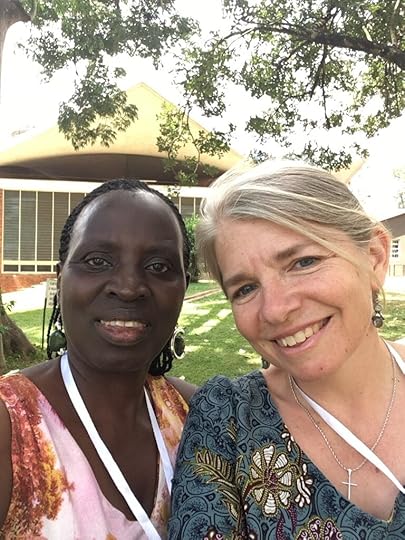 “We Your People” songwriters Josephine Munyeli (left) and Rebecca Mosley (right).
“We Your People” songwriters Josephine Munyeli (left) and Rebecca Mosley (right).It’s special when the ministry of peacemaking becomes so powerful in a place, it inspires art which inspires people forward. Think of songs from the anti-apartheid movement in South Africa, or the civil rights movement in the US.
In 2019 a song was added to the Mennonite Voices Together hymnal called “We Your People Sing your Praises.” The song was co-written by two women. Rebecca Mosley of the US was serving as MCC Co-Representative for Burundi & Rwanda. Josephine Munyeli of Rwanda was on the staff of World Vision. Josephine, a worker for peace and healing, is a survivor of the 1994 Rwanda genocide, when she was almost killed.
Josephine and Rebecca became close companions while serving as worship leaders for the African Great Lakes Initiative (or GLI). Being their friend was a joy for me when I was part of beginning the GLI, which for 20 years has built a deep peacemaking community across the divides and conflicts of the region by creating profound space for both lament and hope.
The song, written in English and French, became the GLI theme song and is sung every year at GLI’s annual gathering of about 100 people. Each year it is also sung by leaders at the Christian Forum for Reconciliation in Northeast Asia, and it has been translated into Japanese and Korean.
What led to the song, says Rebecca, is that she and Josphine could not find any existing song that, in one musical composition, would help participants remember all the important themes that bound them together. “We were asking this,” says Rebecca. “What kind of Christian leaders do we need to be in order to keep walking through hardship and lament honestly and in community, allowing our character to be shaped by our suffering savior Jesus, fixing our eyes on the new creation that is coming?” Here is how the song answers that question and calls us forward.
We Your People Sing Your Praises
We your people sing your praises
As together we are sent
To reveal your new creation
In the shadows of lament.
Give us courage for the journey,
Shephard Jesus, be our guide,
Let us lead with hope and passion
‘Til all things are reconciled.
In this time of great challenges in our world, may this song spread across God’s earth to shape leaders and communities who live such a way of change.
See the song’s words and music here, and a video of the song being sung at the 2022 Mennonite World Assembly in Indonesia.
Chris Rice is an award-winning writer, social entrepreneur, and global networker dedicated to fostering social healing and spiritual renewal. His books include Reconciling All Things: A Christian Vision for Justice, Peace, and Healing, and From Pandemic to Renewal: Practices for a World Shaken by Crisis.
February 28, 2025
Remembering the private Richard Hays
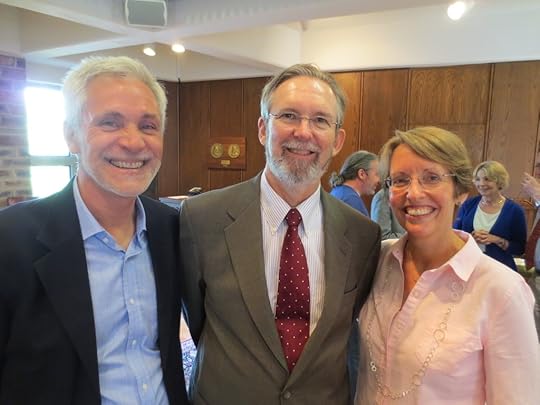 With Richard and Donna at a Duke Divinity School event.
With Richard and Donna at a Duke Divinity School event.Richard Hays, New Testament scholar and one of the critical influences in my life, passed away on January 3 in Nashville, Tennessee. Today is a memorial service for Richard at Duke University. If I could be there and say something it would be this.
I spent 17 meaningful years in grassroots justice and social healing ministry in Mississippi. When my wife Donna and I departed in 1998, it put me in a wilderness. But a question from a trusted counselor guided me: “What idea of the future fills you with joy?” To study. That idea filled me with joy. To go to seminary. To bring theological language and meaning to my Mississippi years and develop an intellectual framework for my next chapter of service. Wow. That was a life-giving vision.
Donna and I visited many seminaries, and we settled on a seminary and a city with great excitement. Donna looked forward to serving there as a nurse and began a job search. We looked for apartments. We prepared our three young children for the move.
While this was happening, we visited two mentors in San Francisco, John and Judy Alexander. John listened to our plan. And then he blew it up.
“Don’t go there. That seminary will screw you up. You need to go to Duke Divinity School. I have friends there who will take care of you.”
John’s blunt advice would change the course of our lives. We did end up in Durham, where Donna and our three young children flourished. And I did end up at Duke.
Lo and behold, Richard Hays was one of the friends John spoke of. Richard and I quickly bonded due to John, and our common experience of living in Christian community, and Donna and I enjoyed meals with him and his wonderful wife Judy.
In the classroom I received the immense gifts of the public Richard, his eloquent and prophetic scholarship and teaching.
But Richard most took care of me as my boss, when he was Dean of Duke Divinity School and I was Director of the Center for Reconciliation. When the world and even the church began to tire of “reconciliation,” Richard insisted Christians could not leave behind this costly call to deep transformation of the world that he believed was at the center of the New Testament vision(see his short article here). “Duke Divinity School should not have a center for reconciliation,” Richard often said. “It should be a center for reconciliation.” That was a pretty preposterous aspiration for a university and its volatile faculty politics. Yet I witnessed Richard embody that vision in many tense meetings.
But it was the private Richard, meeting in his Dean’s office, from whom I received gifts more precious than the public ones. His gentleness. Humility. Pastoral presence. As a leader, his sensitivity to the Spirit in the life of school. And his deep insight into how the Spirit was at work in me in ways which empowered me and sent me forward with courage. Richard loved Jesus, and I experienced the spirit of Christ in him. And the voice of Christ.
The moment when Richard most profoundly took care of me was a meeting when I was going through a wilderness about my work and calling as director of the Center. At one point after listening to my angst, he turned to me and looked me in the eye. Speaking softly, through a series of questions, he helped me see who I was not. And then, in concise biblical language, he told me who I was, what he believed was my primary identity and call. That “word” shocked me with insight and love. It still guides me each day as I discern where to direct my life and energy.
That year, Richard’s “word” was a key moment in my part of the journey that led me and Donna from Durham to serve with Mennonite Central Committee in South Korea for five years across the divide between the two Koreas. Richard saw deep into my heart and soul. After ten rich years with the Center, his “word” helped me let go of Duke while sending me out from and in communion with Duke, as an ambassador, and as his friend.
“I have friends who will take care of you,” said John. What a gift, the divine interruptions in our lives. Thank you, God, for surprising us with people who take care of us beyond what we could ever ask for or imagine. Thank you for the people you give us who reveal our deepest and truest identities to us. Most of all, today, thank you for your deep love for Richard, which he passed into me. I’m quite sure I’m not the only one.
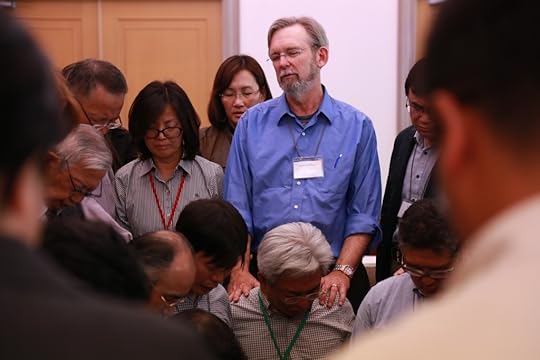 While Duke Divinity Dean, Richard and his wife Judy came to Nagasaki for the 2015 Christian Forum for Reconciliation in Northeast Asia. His teaching, pastoral presence, and listening was an immense gift to the leaders gathered from China mainland, Hong Kong, Japan, South Korea, and the US. Here he prays for participants from Japan.
While Duke Divinity Dean, Richard and his wife Judy came to Nagasaki for the 2015 Christian Forum for Reconciliation in Northeast Asia. His teaching, pastoral presence, and listening was an immense gift to the leaders gathered from China mainland, Hong Kong, Japan, South Korea, and the US. Here he prays for participants from Japan.Chris Rice is an award-winning writer, social entrepreneur, and global networker dedicated to fostering social healing and spiritual renewal. His books include Reconciling All Things: A Christian Vision for Justice, Peace, and Healing, and From Pandemic to Renewal: Practices for a World Shaken by Crisis.
Remembering the Private Richard Hays
 With Richard and Donna at a Duke Divinity School event.
With Richard and Donna at a Duke Divinity School event.Richard Hays, New Testament scholar and one of the critical influences in my life, passed away on January 3 in Nashville, Tennessee. Today is a memorial service for Richard at Duke University. If I could be there and say something it would be this.
I spent 17 meaningful years in grassroots justice and social healing ministry in Mississippi. When my wife Donna and I departed in 1998, it put me in a wilderness. But a question from a trusted counselor guided me: “What idea of the future fills you with joy?” To study. That idea filled me with joy. To go to seminary. To bring theological language and meaning to my Mississippi years and develop an intellectual framework for my next chapter of service. Wow. That was a life-giving vision.
Donna and I visited many seminaries, and we settled on a seminary and a city with great excitement. Donna looked forward to serving there as a nurse and began a job search. We looked for apartments. We prepared our three young children for the move.
While this was happening, we visited two mentors in San Francisco, John and Judy Alexander. John listened to our plan. And then he blew it up.
“Don’t go there. That seminary will screw you up. You need to go to Duke Divinity School. I have friends there who will take care of you.”
John’s blunt advice would change the course of our lives. We did end up in Durham, where Donna and our three young children flourished. And I did end up at Duke.
Lo and behold, Richard Hays was one of the friends John spoke of. Richard and I quickly bonded due to John, and our common experience of living in Christian community, and Donna and I enjoyed meals with him and his wonderful wife Judy.
In the classroom I received the immense gifts of the public Richard, his eloquent and prophetic scholarship and teaching.
But Richard most took care of me as my boss, when he was Dean of Duke Divinity School and I was Director of the Center for Reconciliation. When the world and even the church began to tire of “reconciliation,” Richard insisted Christians could not leave behind this costly call to deep transformation of the world that he believed was at the center of the New Testament vision(see his short article here). “Duke Divinity School should not have a center for reconciliation,” Richard often said. “It should be a center for reconciliation.” That was a pretty preposterous aspiration for a university and its volatile faculty politics. Yet I witnessed Richard embody that vision in many tense meetings.
But it was the private Richard, meeting in his Dean’s office, from whom I received gifts more precious than the public ones. His gentleness. Humility. Pastoral presence. As a leader, his sensitivity to the Spirit in the life of school. And his deep insight into how the Spirit was at work in me in ways which empowered me and sent me forward with courage. Richard loved Jesus, and I experienced the spirit of Christ in him. And the voice of Christ.
The moment when Richard most profoundly took care of me was a meeting when I was going through a wilderness about my work and calling as director of the Center. At one point after listening to my angst, he turned to me and looked me in the eye. Speaking softly, through a series of questions, he helped me see who I was not. And then, in concise biblical language, he told me who I was, what he believed was my primary identity and call. That “word” shocked me with insight and love. It still guides me each day as I discern where to direct my life and energy.
That year, Richard’s “word” was a key moment in my part of the journey that led me and Donna from Durham to serve with Mennonite Central Committee in South Korea for five years across the divide between the two Koreas. Richard saw deep into my heart and soul. After ten rich years with the Center, his “word” helped me let go of Duke while sending me out from and in communion with Duke, as an ambassador, and as his friend.
“I have friends who will take care of you,” said John. What a gift, the divine interruptions in our lives. Thank you, God, for surprising us with people who take care of us beyond what we could ever ask for or imagine. Thank you for the people you give us who reveal our deepest and truest identities to us. Most of all, today, thank you for your deep love for Richard, which he passed into me. I’m quite sure I’m not the only one.
 While Duke Divinity Dean, Richard and his wife Judy came to Nagasaki for the 2015 Christian Forum for Reconciliation in Northeast Asia. His teaching, pastoral presence, and listening was an immense gift to the leaders gathered from China mainland, Hong Kong, Japan, South Korea, and the US. Here he prays for participants from Japan.
While Duke Divinity Dean, Richard and his wife Judy came to Nagasaki for the 2015 Christian Forum for Reconciliation in Northeast Asia. His teaching, pastoral presence, and listening was an immense gift to the leaders gathered from China mainland, Hong Kong, Japan, South Korea, and the US. Here he prays for participants from Japan.Chris Rice is an award-winning writer, social entrepreneur, and global networker dedicated to fostering social healing and spiritual renewal. His books include Reconciling All Things: A Christian Vision for Justice, Peace, and Healing, and From Pandemic to Renewal: Practices for a World Shaken by Crisis.
January 28, 2025
MCC UN seminar plants seeds of hope and change in New York
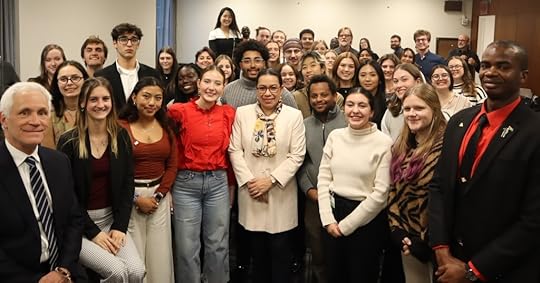 The MCC UN Student Seminar group gathers for a group photo with Ambassador Carolyn Rodrigues-Birkett, Guyana’s Permanent Representative to the United Nations. Guyana currently serves as one of the 10 elected members of the UN Security Council. MCC photo/Yujin Kim
The MCC UN Student Seminar group gathers for a group photo with Ambassador Carolyn Rodrigues-Birkett, Guyana’s Permanent Representative to the United Nations. Guyana currently serves as one of the 10 elected members of the UN Security Council. MCC photo/Yujin KimVery grateful for this article about the seminar which our office organized in New York City last November. I love what the students say about the impact of engaging the question “Does the UN matter?” with diplomats, a member of the UN Security Council, and grassroots peacemakers.
Yujin Kim, the writer, serves with MCC Communications (her father SeongHan Kim is MCC Representative for Northeast Asia). Yujin is a wonderful young adult leader with deep background in both Korea and the US and her voice is fresh and dynamic.
January 7, 2025
Best of 2024
“The world will be saved by beauty” Fyodor Dostoevsky
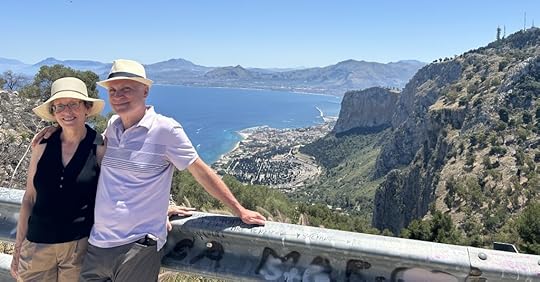 Near Monreale, Sicily with my wife Donna
Near Monreale, Sicily with my wife DonnaFrom work on Palestine-Israel, to Haiti, to the Korean Peninsula, my 2024 ministry year engaging the United Nations faced great challenges. Amidst that, in the spirit of the quote above, where did I find beauty, grace, joy, and wonder?
Favorite books: Stumbling upon the stunning story Impossible Creatures by Katherine Rundell ignited a new interest in young adult fantasy and led me to the Harry Potter series for the first time. For me, an unexpected masterpiece.
Favorite shows: “Shogun,” among the greatest television I’ve ever seen. “A Gentleman in Moscow” turned a man living inside a hotel for 30 years into gripping, beautiful drama.
Most unforgettable meal: On our magical ten-day journey to Sicily, in the hillside city of Ragusa, my wife Donna and I found ourselves, unplanned, at lunch with the owner telling us there’s no menu and would we receive whatever they served us? From her hospitality and stories, to the garden beauty, to the meal’s simplicity, a wondrous “total food” experience.
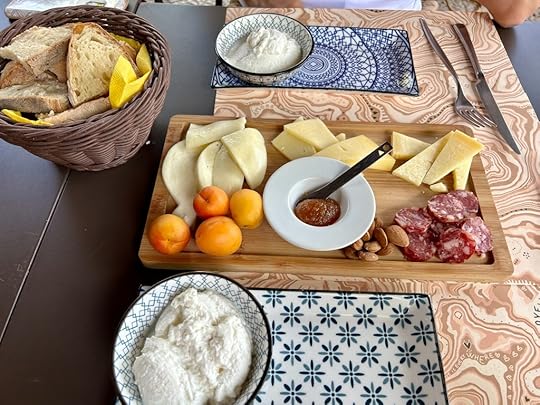 The simple Ragusa lunch, deeply connected to the local people, their soil, their traditions, their love.
The simple Ragusa lunch, deeply connected to the local people, their soil, their traditions, their love.Most fun new experience: Golfing with my sons Christopher and Benjamin.
Best essay: “The Shock of Faith” by New York Times columnist David Brooks about his long journey to Christianity. “Faith,” he writes, “is more like falling in love than it is like finding the answer to a complicated question.”
Best reunion: Hakone, Japan near Mount Fuji with Jongho Kim of South Korea and Katsuki Hirano of Japan, our friendship a fruit of the Northeast Asia Reconciliation Forum. Over three days of scenic walks, bathhouses, and meals we said “Wow!” countless times.
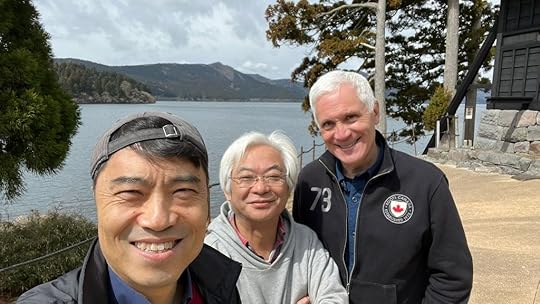 At Lake Ashi, Japan with Jongho (left) and Katsuki.
At Lake Ashi, Japan with Jongho (left) and Katsuki.Best rediscovered music: “Fast Car,” via the tour de force Grammy performance by Traci Chapman and Luke Combs. And Billie Eilish’s “Birds of a Feather” made me feel alive.
Most inspiring sign of hope: As selection committee chair for MCC’s Global Peacemaker Award, learning the stories of courageous peacemakers nominated from across the world. Beneath the headlines, hope is alive and well, planting seeds of deep change.
Favorite event organized: The energy and hope of the 40 students at our MCC UN Student Seminar in New York, engaging UN diplomats and grassroots peacemakers.
 MCC UN seminar students with Guyana’s dynamic ambassador to the UN,
MCC UN seminar students with Guyana’s dynamic ambassador to the UN, a member of the UN Security Council, who spoke to our group.
Favorite thing I wrote: My Christianity Today article “The United Nations is a Misson Field,” an opportunity to reflect on why my five years of ministry in New York has mattered. Believe me, it took time to get to that point. Which is “the point.”
Best New York City culture: I no longer need a map to navigate the vast Met Museum near Central Park, and simply walking through is inspirational. The far lesser-known Met Cloisters, my “retreat” inside the city, is one of New York’s hidden treasures – like being surrounded by Christian art inside a great monastery, overlooking the Hudson River.
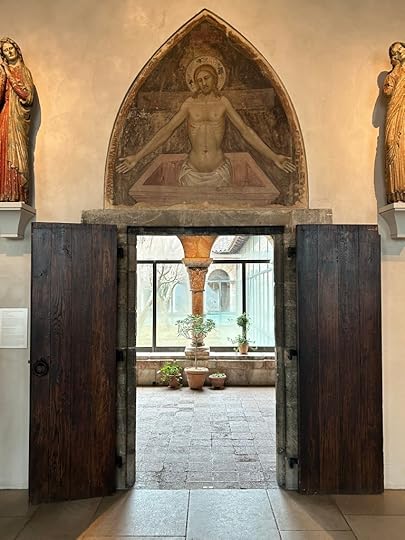 Met Cloisters, New York City.
Met Cloisters, New York City.Favorite speaking moment: Coming up with a podcast format for a men’s retreat talk called “Pittsburgh Strong,” with me and the pastor, both Pittsburgh-born, donning Pirates and Steelers regalia and a football-guided format for a conversation on “cultivating the fruit of the Spirit.” Our opening and closing song? Bruce Springsteen’s “A Good Man is Hard to Find.”
Favorite milestone: The 20-year anniversary of the 2004 conference in Thailand of 3,000 Christian leaders, where I co-convened a challenging week-long issue group on reconciliation of 47 people from 25 places of conflict. Our journey led to a shared prophetic call to action and planted seeds and relationships that have borne rich fruit across the world. It became a turning point in my life – how could I have imagined the 20 years of international ministry that would follow?
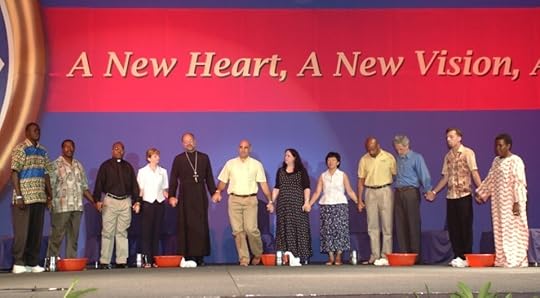 Foot washing among some members of our reconciliation group, our presentation at the end of the 2004 conference. We are grouped by places of division and washed each other’s feet in those groups (I am third from the right). For us, it was a sacramental experience, an anointing into common mission.
Foot washing among some members of our reconciliation group, our presentation at the end of the 2004 conference. We are grouped by places of division and washed each other’s feet in those groups (I am third from the right). For us, it was a sacramental experience, an anointing into common mission.In 2025, may we each reach for and find fresh joy and growth . . . and plant good seed.
December 19, 2024
December Global Briefing: hopeful political engagement
See December 2024 issue of Global Briefing released today, published by the MCC United Nations Office which Chris directs.
In this issue
What the UN Office Director has learned representing MCC to diplomats from 193 countriesMCC brings Palestine and Israel stories of pain and hope alive to UN leaders40 students attend New York seminar to engage peacebuildingMCC Global Peacemaker Award winner visits UNSeptember 26, 2024
The United Nations is a Mission Field
As leaders across the world gather here in New York this week, see my article in Christianity Today, “The United Nations is a Mission Field,” online here, and PDF here.
This month marks 10 years for me of serving with Mennonite Central Committee, the last 5 engaging the United Nations. I am grateful to offer this reflection on why it matters to serve and be present here.
September 7, 2023
How readers are being touched by my new book
Here are a few comments I’ve seen from readers about my new book From Pandemic to Renewal: Practices for a World Shaken by Crisis. If you haven’t gotten your copy yet, I hope these comments get you online to make your order and start reading!
From an author of books on spirituality: “What makes this book a rare find is the author’s ability to step outside an American take on culture and change. Reading it is like boarding a helicopter with a personal guide to all the possibilities the pandemic has ironically produced. This is a golden moment for the church and Rice tells us how to make the most of this time.”
From an organizational leader: “Chris Rice has given individuals and especially leaders of organizations a timely and timeless resource. I have already applied its eight chapters to my leadership in the field I work in. You will find his book to be a practical resource for years to come. Highly recommended.”
From an Asian American leader: “Don’t be misled, this book doesn’t just relate to the pandemic, but offers timeless, Kairos principles that the Holy Spirit has always employed. I especially appreciate Rice’s integration of personal practices with civic ones. Not only are we to receive God’s belovedness and to act with integrity, but we are also challenged to be prophetic and political disciples in the world. Excellent read for one’s individual discipleship and for group formation!”
From a professor at a Christian university: “I am so very grateful for this timely book. Our book group has found it helpful in so many ways, and I would recommend it as an outstanding book for church groups to study together as well.”
From a book review: “I teared up as I read chapter six, feeling like God was speaking directly to me and affirming the things on my mind that I’ve been shy to approach Him about in conversation, but because of this book, am now moved to explore with Him vulnerably and openly. I am so thankful for this book and highly recommend it to anyone who finds themselves in a similar wilderness and wanting to know how to create a space for God to speak into it.”
From a magazine editor: Chris Rice is, at heart, what religion is about. Religion binds up what has become divided for the healing of the whole body. Rice, drawing on his transnational work as a Christian peacemaker, missioner, and reconciler brings the best of the faith to our contemporary challenges. “From Pandemic to Renewal” is a love letter to young Christians: Don’t let others steal Jesus from you. There is a power in scripture and Christian tradition that can meet the needs you face today in a post-pandemic, climate-confused, politically divided culture. Claim it. This easy-to-read, engaging, and hopeful book comes with discussion questions for each chapter.
Intrigued? Order your book in paperback from InterVarsity Press or Amazon . . . listen to the audiobook . . . read the e-book . . . or order from your favorite local bookstore!
July 28, 2023
My Christianity Today article: Why US Christians must wrestle with a Korea divided in two
Yesterday marked 70 years since the Korean War Armistice, which stopped the fighting but did not end the war. 70 years of Korean people divided between South and North. 70 years of millions of people separated from their loved ones. 70 years without peace.
See my article in Christianity Today magazine … And please take time to learn, to lament, to pray … and to act.



